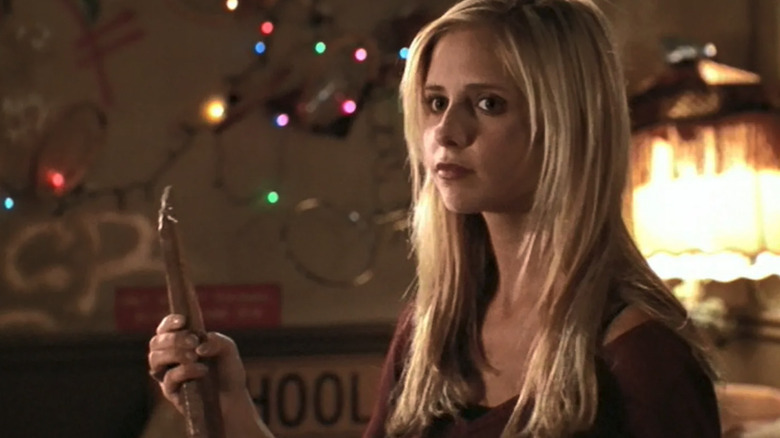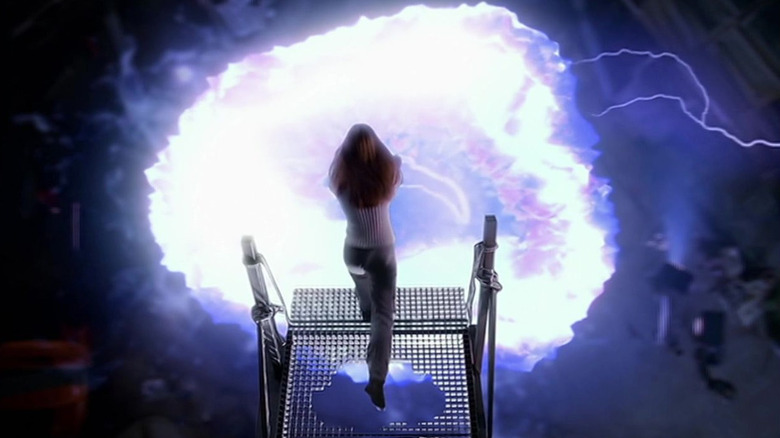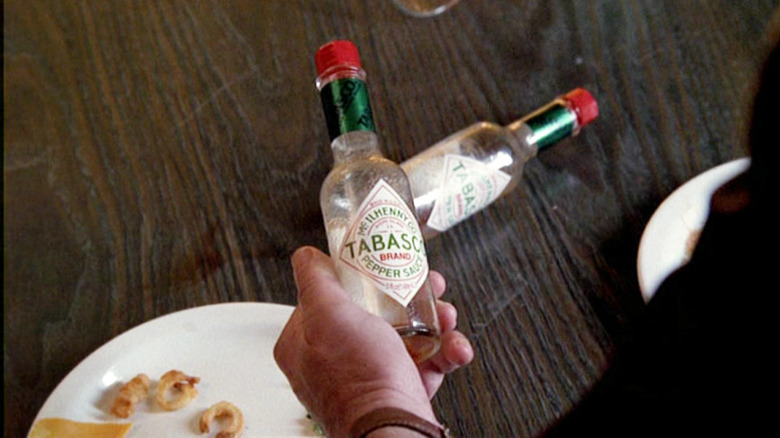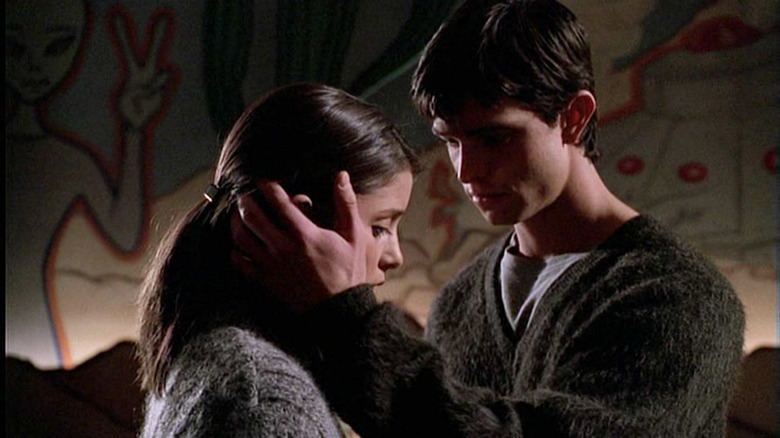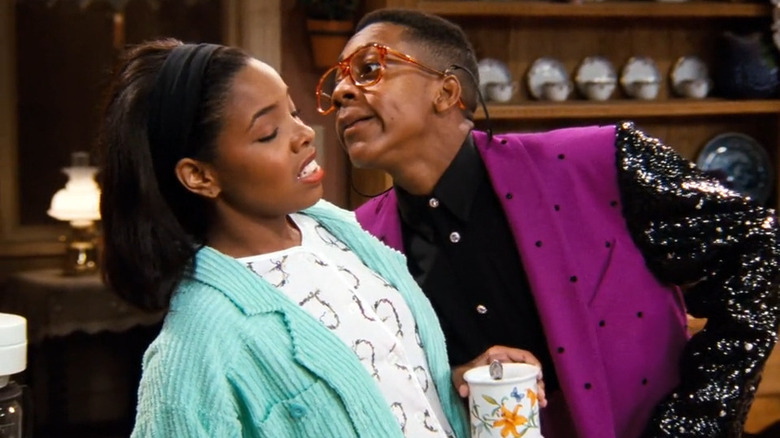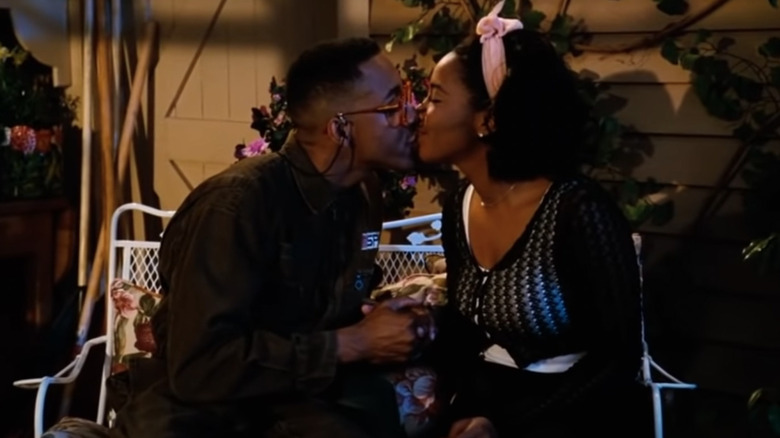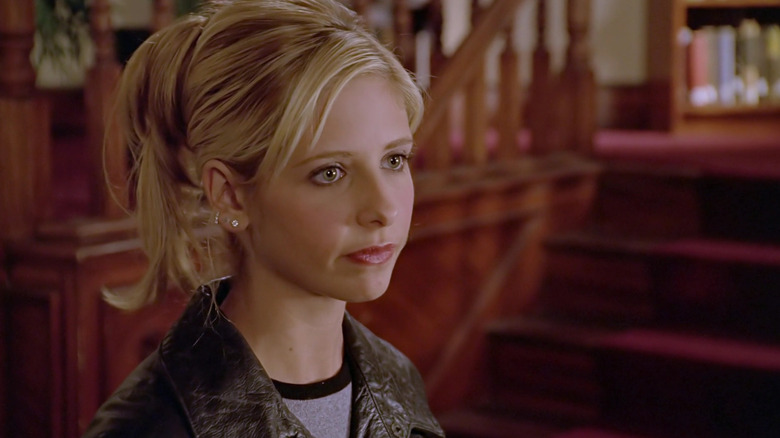Why So Many '90s Shows Became Totally Different After Changing Networks
For audiences, television is entertainment, but for the companies behind the scenes, TV is big business. From the late '20s through the early '80s, American Broadcasting Company (ABC), National Broadcasting Company (NBC), and Columbia Broadcasting System (CBS) had no lasting competition and they ruled the television landscape. In their heyday, the big three produced loads of classics like "The Three Stooges," "The Lone Ranger," "Gunsmoke," "Howdy Doody," "The Ed Sullivan Show," and "Bonanza," just to name a few. I've never seen an entire episode of any of those shows, but I recognize their names and know, generally, what they are about, which proves they have a firm foothold in popular culture. Cementing such a place in entertainment history is something every television show hopes to do, but doing so got a lot harder in the '90s.
In the infancy of television, viewers had extremely limited choices, so everyone's eyes were glued to the same shows on the same three channels, which made it a lot easier to attract attention. After decades of reigning over TV land, the big three finally experienced some competition in the '90s when new networks like Fox, The WB, and UPN burst on the scene. For the first time, network tv audiences had more choices and each network had to earn their attention. Each broadcasting company continued producing original content, but they weren't opposed to stealing each other's popular programs if the opportunity presented itself.
A number of beloved shows were poached from their original networks in the 1990s, including "Buffy the Vampire Slayer," "Roswell," and "Family Matters," which led to changes that altered the shows forever.
Onto another network a Slayer Is Born
The WB hit the airwaves on January 11, 1995, and captured the hearts of millennials two years later with the debut of "Buffy The Vampire Slayer." The show was a certified hit from the start, earning 4.5 million viewers with its pilot episode, and its popularity continued for five glorious seasons on The WB until the slayer (Sarah Michelle Gellar) met the first demon she couldn't defeat, greed. After a successful five-year run, Fox, the company that owns the rights to the series, demanded more money from The WB, but the network refused to pony up more dough. So on May 22, 2001, Buffy Anne Summers jumped into a portal to Hell and died ... for a few months, anyway.
When The WB refused to bend to Fox's demands, UPN saw a golden opportunity to steal a beloved show, and they happily wrote Fox a very large check for $112.5 million. There were a few popular shows on the network before its acquisition of the slayer, such as "Star Trek: Voyager" and "Girlfriends," but The WB had nearly doubled its viewers, and the network hoped to close that gap with its purchase of "Buffy The Vampire Slayer." It didn't go exactly as they'd hoped.
A bloody mess
Some staffing changes were made when the show jumped networks. "Buffy The Vampire Slayer" creator Joss Whedon had his hands full with "Buffy" and "Angel," which meant he couldn't devote as much time to the show as he had in previous seasons. Longtime writer Marti Noxon stepped up as Executive Producer and eventually became the showrunner when Whedon was further overwhelmed by the greenlighting of yet another series, "Firefly."
Season 6 of "Buffy The Vampire Slayer" is highly controversial and widely despised. /Film's Liam Gaughan rated it the worst season of the entire series, and most self-respecting Buffy fans agree. First of all, it brought Buffy back from the dead, which was an incredibly cheap hail mary to milk the series for more money and views. Then, it reduced a newly reformed Spike, who many fans had grown to adore, to an attempted rapist. On top of all that mess, the season gave fans an angst-ridden, self-pitying caricature of the strong and resilient Buffy Summers we'd grown to love for five years. Aside from the musical episode, "Once More With Feeling," the entire season felt uninspired, like a cheap imitation of its former self. For many fans, having to tune into an unfamiliar network to watch this debacle only added insult to injury.
UPN tried to get the most bang for their buck and housed Buffy for two seasons, despite plummeting ratings. After its seventh season, "Buffy The Vampire Slayer" finally came to an end in 2003. In my headcanon, Buffy went out like a champ when she jumped in that Hell portal, and her work is finished.
Hot sauce protest
Our next '90s show begins with a death ... sort of. I guess nobody ever really died on The WB. "Roswell" focuses on three average-looking teenagers, Max (Jason Behr), Michael (Brendan Fehr), and Isabel (Katherine Heigl) as they struggle to keep their alien identities a secret after one of them saves Liz Parker's life (Shiri Appleby). Like most WB shows, the series focused on all the trials and tribulations of being an alienated, love-sick teenager, but it never quite stuck its landing on the network the way "Buffy The Vampire Slayer" or "Dawson's Creek" did. However, the show had a very loyal and obsessive fanbase.
After a lackluster first season, news broke that The WB was considering canceling the show, and those were fightin' words in the '90s. In protest, "Roswell" fans sent 6,000 bottles of Tabasco sauce (the teen alien's favorite condiment) to the network (via The New York Times). They saved the show, but only for another season, after which the network decided to cancel it again. For real this time.
Once again, armed with their trusty hot sauce, viewers protested the decision by sending 12,000 Tabasco bottles to The WB's rival network, UPN, in hopes they would pick up the series as they had done with "Buffy The Vampire Slayer" a month earlier (Via The New York Times). ”I will say it made a difference,” Dean Valentine, chief executive of UPN, told The New York Times. ”You really have to sit down and think about a person who gets up in the morning, who has many, many things to do, and who took part of their day to go to the grocery store and buy a bottle of hot sauce to send to some executive in L.A.”
Science fiction double fiction
Whether they were excited by the potential fanbase they'd steal from the competition or afraid of what the obsessed fans might do if they didn't run the show is unclear. Either way, UPN snatched up the series, but proved, once again, they had no idea what to do with a beloved show. The Network decided to place "Roswell" in its Tuesday night time slot, where it would run immediately after their other newly acquired WB hit, "Buffy The Vampire Slayer." The lineup might have worked if the network didn't try so hard.
WB executive producer Kevin Brown told The New York Post that one of the most important elements of the show was "the emotional relationships between the characters." And he was absolutely right. Unfortunately, UPN didn't get the memo, and they'd systematically ruin every single protagonist and relationship in the series.
Season 3 of "Roswell" is a cross between a poor man's "X-Files" and a cheesy soap opera. The rebel of the group, Michael, becomes a better student and a part-time security guard (ick), and Maria still breaks up with him because she loves him too much. Major ick! And the element of the show that fans loved the most, the unconditional love between star-crossed lovers Max and Liz, was blown to pieces by banal storylines of teen pregnancy and a missing kid. They made an uninspired attempt to balance out the cringe with some sci-fi elements, but the injection of shapeshifters, mind control, and an extraterrestrial Hollywood producer feels like the writers were chucking anything at the wall to see what would stick. In case you can't tell already, none of it did.
UPN canceled Roswell following its third season. After their spectacular mishandling of the series, fans didn't bother to send them any more Tabasco.
'Did I do that?'
It wasn't only newer networks like UPN and The WB that competed heavily in the '90s, so did the old hats. One example of this occurred in 1997 when the long-running series "Family Matters" left ABC after eight seasons and gained a new home with CBS.
The show was a spin-off of another ABC program, "Perfect Strangers," and initially focused on the daily problems of The Winslow family, but that quickly changed when audiences caught a glimpse of their next-door neighbor, Steve Urkel (Jaleel White). Clad in large glasses, high waters, and suspenders, Urkel's goofiness and unconditional love (and obsession) for Laura Winslow (Kellie Shanygne Williams) stole viewers' hearts and he was one reason the show was so loved. Also, he used his scientific knowledge to create a handsome alter ego, and who wasn't at least a little bit smitten with Stefan (Jaleel White) in the '90s?
At its peak, 12.6 million people tuned in to watch "Family Matters," but the popularity of Urkel and The Winslows couldn't possibly last forever. By its eighth season, the show had lost 3.8 million viewers, but that didn't stop CBS from swooping in and reportedly paying around $40 million to steal the program from their rival. Maybe they thought they could rejuvenate the show or they just wanted to dine on any possible fat left on the series' once-popular storylines. Either way, season 9 of "Family Matters" switched networks, and made some pretty serious changes to the show.
Replacing Mrs. Winslow and Laura loves Steve
Midway through the final season, Jo Marie Payton, who played Mrs. Winslow, left the show and was replaced by Judyann Elder. "I just wanted something else to do," Payton told TV Series Finale, "just to energize me a little bit more, on the creative side." This is probably the most controversial change in the entire series because Elder's lack of chemistry with the cast was in sharp contrast to Payton's original portrayal. Payton's exit left a gaping wound in the series that it never recovered from.
One big change also took place on-screen. Laura developed feelings for both Urkel and his cloned alter-ego, Stefan. After 8 solid years of cold rejection, Urkel finally gets the girl in episode 20 when the triangle finally resolves itself. Putting the replacement of Mrs. Winslow aside, the network change of "Family Matters" is the most successful one we've discussed because it played into one of the series' strengths, the chemistry and evolving relationship between Laura and Steve.
In the final season, Laura learns to look past the superficial and dumps the cool, attractive Stefan for the geek with a heart of gold. Those of us who shipped the couple had been waiting for her to do that for nearly a decade, and we were satisfied that the series ended with them together.
Magical era
If you got lucky, like me, you were around to watch and fall in love with these shows at their peak. At the time, we were largely ignorant of the fact that networks were making backroom deals and writing very large checks for access to our eyeballs, and it was probably better that way. Back then, we didn't care about money, ratings, or broadcasting networks, we just wanted to watch Liz and Max overcome their struggles, Steve and Laura fall in love, and Buffy kill (and kiss) demons.
Each generation tends to believe their childhood occurred at the peak of society, and '90s kids are no different. If time machines existed, most of us would gladly go back, throw on a pair of JNCOs, adorn our hair with butterfly clips, and re-experience the excitement of watching a new episode of our favorite tv show. This time around, The WB and UPN would receive one more Tabasco bottle.

